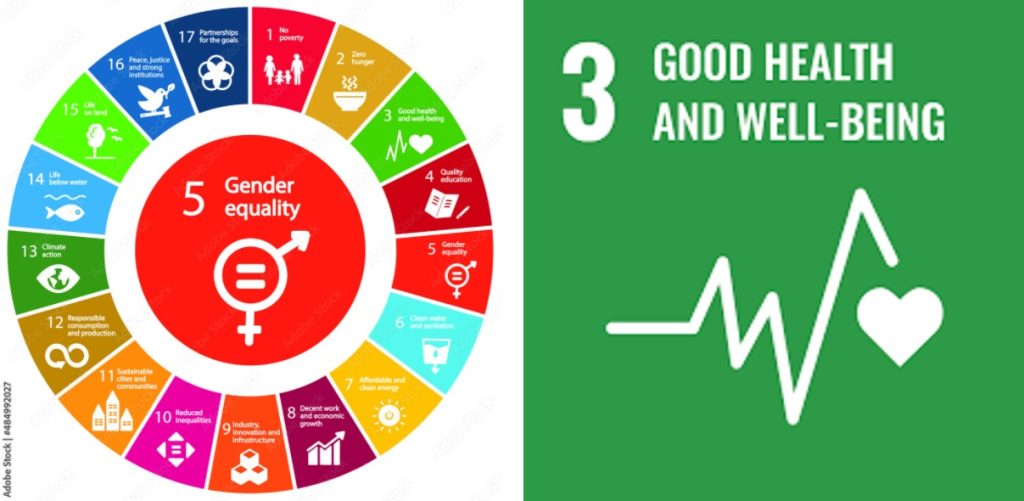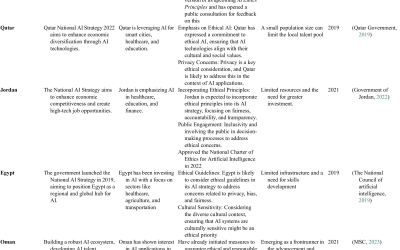Gender & Decoloniality: Reflecting on Gender Journeys so far

At the Global South Artificial Intelligence for Pandemic, Epidemic Preparedness and Response (AI4PEP) Network, we continue to convene interdisciplinary experts across the Global South to harness the power of AI and strengthen health systems, and outcomes across the Global South. Our existence is founded on the mobilization of an interdisciplinary approach towards equitable health, emphasizing a decolonial and an intersectional feminist lens. Our position as the catalyst of this work entails supporting our partners across Africa, Asia, Latin America & the Caribbean, and the Middle East and North Africa regions in pursuing innovative health research that centers around the experiences and lived realities of formerly colonized subjects.
This short article highlights the gender and decolonial journeys employed by our partners in integrating a gender transformative and decolonial lens in the various stages of their research. It particularly focuses on strides taken by teams, Ethiopia, the Philippines, and Senegal.
An Intersectional & Decolonial Lens in Health Research
Our motivation for an intersectional and a decolonial lens is inspired by our consciousness of existing gender and racial disparities that mediate the unequal distribution of power, economic resources, knowledge production, and social currency in the field of global health, particularly for people in the Global South. The inventor of Intersectional feminist theory, Prof. Kimberle Crenshaw coined the concept of intersectionality as a way of understanding different axes of oppression as compounded, interlocking, and multi-constitutive, which in turn exacerbates the vulnerability of some social groups to oppression according to their gender, race, class, geography, sexualities.
The understanding of these gendered power dynamics and how they shape gendered access to health and precarity to infectious diseases propels our interventions to be contextually contingent, gender transformative, locally relevant, and inclusive. Meanwhile, Indigenous ally and researcher Jacqueline Quinless defines decolonizing research as “an everyday practice that involves the critique of conventional epistemologies and dominant knowledge systems to create culturally respectful frameworks that do not place the value of western ways of understanding over Indigenous ways of knowing.” This conjures a strong power consciousness of the imperial biases that are inherent to western knowledge production systems, culturally rooted epistemic tools with which to challenge the colonial bias of western knowledge systems and locating Global South voices as at the center of the knowledge production process.
Let us reflect on how our partners have been decolonizing and engendering research in their different locales.
Ethiopia
Earlier into their research study, our partners from Polio Antenna, Jimma University in Ethiopia determined that their clinical data was gender blind as the data was not gender disaggregated. They saw this as a challenge that precluded a thorough quantitative and qualitative analysis of the broader gender patterns and dynamics around the spread of the polio virus.
According to the Principal Investigator Prof. Gelan Ayana, this challenge spurred ingenuity and innovation on their part. He stated, “we worked together with the team and gender disaggregated and manually gender disaggregated the data using the records from the hospitals. Even though it took a while, it was worth it.”
Ethiopia’s gender health data strategy affirms our own approach towards gender-transformative health in the Global South. Gender health data remains the fulcrum of a gender analysis as it uncovers frequently overlooked gender patterns and dynamics that perpetuates gender disparities in health care, diagnosis, treatment, and prevention of emerging and re-emerging infectious diseases. However, the pervasiveness of gender bias in health data (collection and interpretation) thwarts the well-intentioned efforts meant to engender health research. This team has overcome this possible barrier through their inclination to utilize an intersectional framework at all costs. However, it is crucial to note that this is only the beginning, the assignment of gender reflexivity is a continuous engagement throughout the stages of the research.
Philippines
The Philippines team from project ATIPAN+ (Telehealth Data, Predictions, Pandemic, Prevention and Prevention (TDP4): Early Resources Mobilization and Long-Term Mental Health Response in Highly Vulnerable Indigenous Communities) from the University of San Augustin are also among the vanguards who are championing gender-transformative research action. Since this team serves underserved Indigenous communities whose cultures rest on community engagement and participatory-research methods, it was near impossible to impose colonial understandings of gender in health. Their gender journey intentionally locates women’s mental health needs at the centre of their research inquiry. During the month of April 2024, the team proudly launched its gender-consultative circles where they convene women from these communities to discuss their health needs and solicit their views about gender-specific interventions and strategies that may be deployed to improve their access to knowledge, health services, treatment, and ongoing mental health support.
The team’s project is unique in the sense that it leverages Artificial Intelligence (AI) to advance mental health care and wellness. The data generated during these consultative gender engagements forms a crucial part of the intervention process as it may be used to train the AI models and inform intersectional and inclusive health service delivery. This work embodies the harmonious marriage between our working frameworks, decolonial theories and feminist praxis. More so, in its ability to bring about practical health solutions. The Philippines Gender Lead, Dr. Roselle Rivera spoke to us about the gender engagement sessions and stated, “simple sex/gender disaggregated data cannot be a basis for a strong gender analysis in this day in age. We need to strive to do more and create sustainable development policies and programs by integrating the voices of the beneficiaries of our research efforts.” Her words speak volumes about ATIPAN’s genuine intentions behind the work and their situatedness as respectful allies who approach the process with cultural humility. Additionally, this strategy demonstrates ATIPAN+’s strength in executing a decolonial lens through healthy allyship and equitable co-creation of a feminist futurity in the Global South.
Senegal
Meanwhile, our partners from Senegal at AI and Hybrid modeling for Community-based early detection of zoonotic disease in the context of climate change in Senegal (AI4DECLIC-Senegal), at Cheikh Anta Diop University in Senegal are also utilizing a gender and intersectional approach, in tandem with community participatory-research methods. From as early as the project conception, the team professes to have been gender sensitive, and reflexive, addressing conscious and unconscious gender biases as they arise. According to the AI4DECLIC Team, the data collection system strives to put gender at the centre of the research process by collecting disaggregated data according to the following key variables, gender, class, and age.
When asked why this work was important for his team, Prof. Sylvian Faye, the Project’s Principal Investigator stated, “this approach is important because it will enable us to better comprehend the relationship between zoonotic diseases and social inequalities, including the impact of social determinants such as social conditions, governance, and public policies.” Additionally, Faye emphasized the need to use gender-inclusive language whenever interacting with the community, addressing gender stereotypes as they arise, and most importantly, ensuring that the findings are integrated to shape the AI models in a way that is responsive to the needs of the community. For Team Senegal, it is imperative to establish a comprehensive framework and a tool kit for gender intersectionality and inclusivity, a culture of consistent learning and evolution, and most importantly, comprehensive AI auditing tools using machine learning methods.
Given the reality that there is no magic bullet for gender intersectionality and transformative research, these gender journeys illuminate the reality of decolonial methodologies as culturally and contextually contingent. For example, Team Ethiopia’s gender journey draws attention to the formidable structural challenges frequently faced by researchers in integrating a gender lens in health in their context, while also demonstrating the innovation necessitated to transcend those. Over, and above that, it lays bare the concerted efforts and fervour invested to make gender transformative health research a reality. Equally, the strength of the Philippines team lies in their ability to put the voices of their beneficiaries at the centre of the study. The ability to integrate this situated knowledge with actionable goals that seek to improve health outcomes challenges mainstream approaches that merge these tedious and painstaking methods.
These journeys are only a glimpse of the work that has occurred, is ongoing, and has yet to unfold, and not the end of an event. The process forms a crucial part of our sustainability plan because it offers a safe space for knowledge exchange and cross fertilization of ideas among our partners, while also fostering a new culture of decolonizing research through a gender and intersectional lens.
